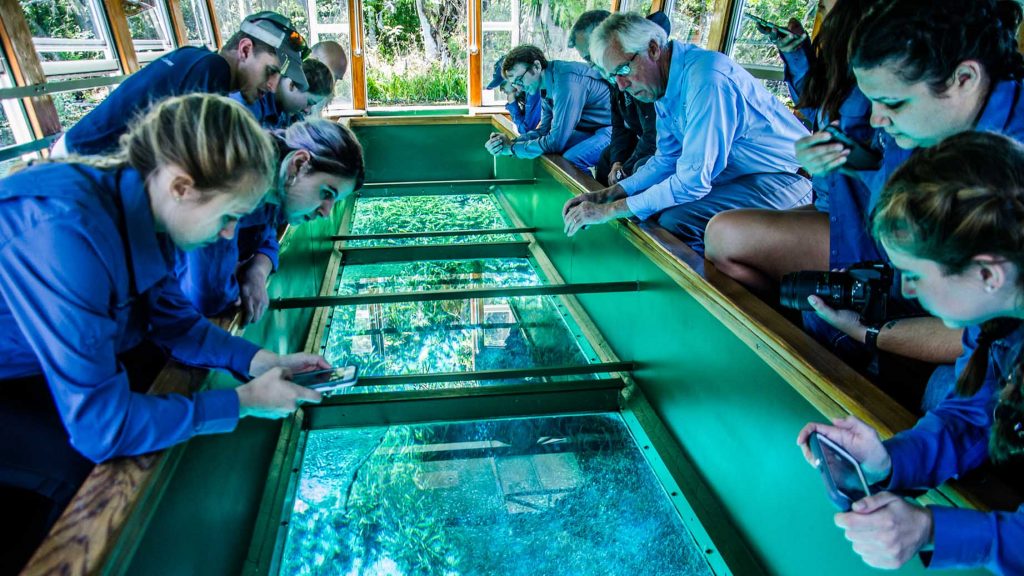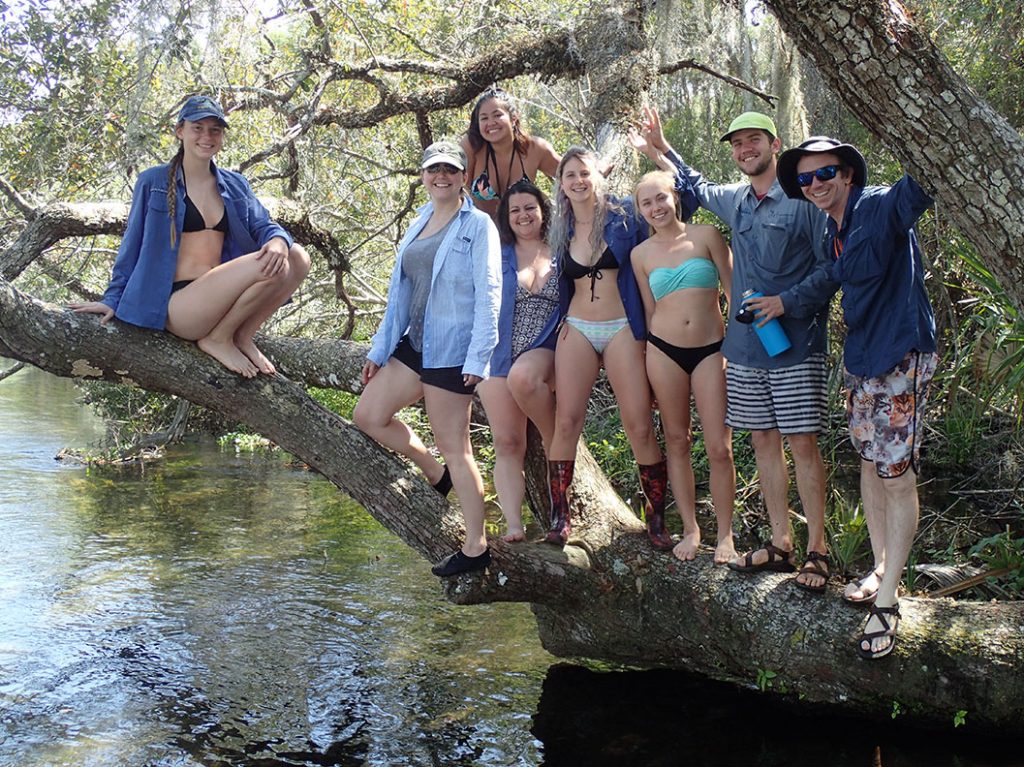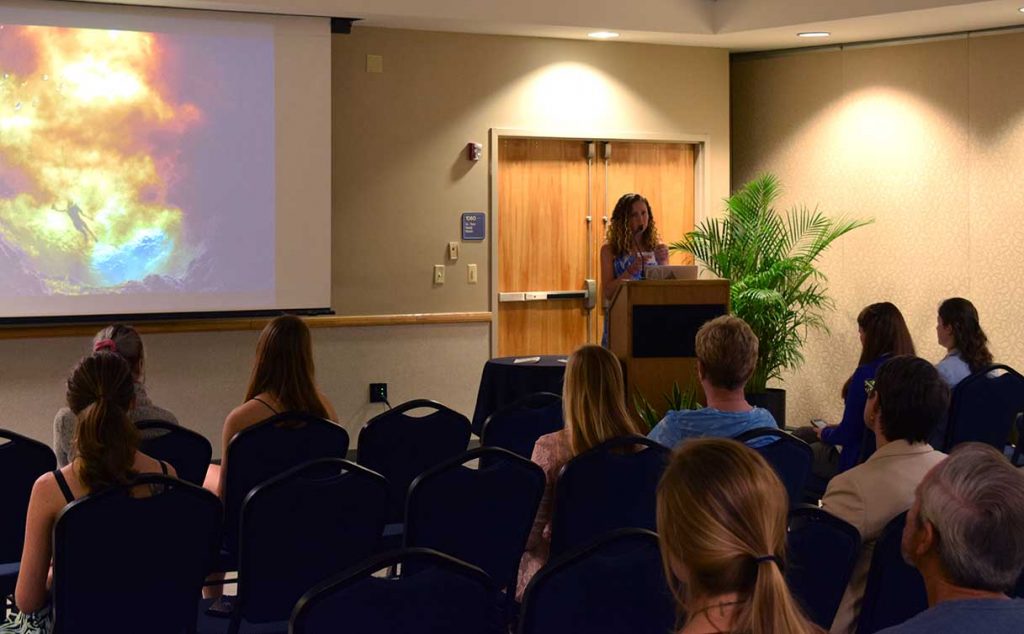
Every spring, the Environmental Center and a select group of students, embark on a journey exploring the St. Johns River and its diverse watershed. These students enroll in the St. Johns River Experience, a multidisciplinary Transformational Learning Opportunity that combines classroom learning with experiential learning. The highlight of the course is a full-immersion trip over spring break where students spend their days visiting state parks, swimming in springs, paddling down tributaries and boating on the St. Johns River.
Here is a short video recapping the 2017 St. Johns River Experience. The video was produced by student Sean Lahav.
Learning from the Experts
Throughout the semester, students interacted with a number of guest speakers who discussed, in depth, the pressing issues affecting the St. Johns River. Additionally, the speakers provided advice to students about possible career paths, ranging from government scientist to nonprofit advocate.
Some of this year’s guest speakers included:
- Robert Knight, Florida Springs Institute
- Pete Butt, Karst Environmental Services
- Lisa Rinaman, St. Johns Riverkeeper
- Dr. Quint White, Jacksonville University Marine Science Research Institute
- Dr. Keith Ashley, UNF Archeology Lab
- Melissa Long, City of Jacksonville Environmental Quality Division
Exploring the Watershed
The St. Johns River is Florida’s longest river at 310 miles and its watershed covers about 7.8 million acres, or about 20 percent of Florida. The St. Johns River Experience featured a number trips that attempted to introduce students to the varied ecosystems within the watershed.
The first excursion of the semester was a unique paddle on the St. Johns River in downtown Jacksonville. The students paddled large “battle” canoes from the Museum of Science and History to the Riverside Arts Market. Shout out to our outfitter, Up the Creek Xpeditions!

During the spring break trip, students explored the parks, springs and tributaries of the middle basin. The trip started with an exploration of Hontoon Island State Park, where students learned about the importance of upland habitat from naturalist Jake FitzRoy. While on the hike, students spotted a dusky pygmy rattlesnake and saw the remnants of a recent prescribed burn.
Naturalist Jake FitzRoy showing students invasive apple snail eggs.
The following day, students explored the St. Johns River by boat. Departing from Hontoon Island State Park, the group traveled south to Blue Spring State Park for a picnic lunch and a swim in the spring. The last stop was at a swimming beach along the banks of the St. Johns River.
While on the trip, students also explored some of the tributaries that feed into the St. Johns River. The first tributary the students explored was Silver River, which feeds into the largest tributary of the St. Johns River, the Ocklawaha River. For this trip, students boarded the iconic glass bottom boats at Silver Springs State Park.

The other tributaries explored by students were done so via canoe. The first paddle was along Juniper Springs Run in the Ocala National Forest. This pristine run winds through some of Florida’s best scrub habitat. The students also paddled Rock Springs Run in Apopka. During this paddle, students were “treated” to a spring rain storm.


Service and Restoration
In past years the St. Johns River Experience focused solely on education, however, this year students participated in a service project helping to restore water quality in the St. Johns River at Lake Jesup.
Partnering with the Seminole Education, Restoration and Volunteer (SERV) Program in Seminole County, students helped plant 1,800 native plants and removed six bags of trash and some invasive plants found in the area. Huge thank you to all the staff at SERV who helped with this project.

St. Johns River Student Forum
The semester ended with the St. Johns River Student Forum, an educational community forum focused on what the students learned during the St. Johns River Experience. This was another new addition to the St. Johns River Experience and something we hope to host annually.
The forum featured selected student presentations from the class. All students were required to complete a final presentation, and they selected which presentations would be showcased at the forum. This was one of the hardest assignments all semester because all of the presentations were great!
The keynote speaker for the forum was National Geographic Explorer and conservation photographer, Jenny Adler. Her current project, “Walking on Water,” focuses on reconnecting the next generation of Floridians to the “aquifer beneath their feet,” utilizing 360 degree underwater photography and immersive education. This project introduces elementary school students to the springs, cameras in hand, and teaches them, up close and personal, about the aquifer via the first 360-virtual tour of the Floridan Aquifer.
Thank You!
We would like to thank the Office of Undergraduate Studies for sponsoring this and other Transformational Learning Opportunities at UNF. We would also like to thank the Cummer Family Foundation for their continued support of this and other Environmental Center programs.
Lastly, we would like to thank each of the students who participated in the 2017 St. Johns River Experience.
- Cathy Black – Junior, Coastal Biology
- Lacy Bocharski – Junior, Anthropology
- Kyle Kenney – Sophomore, Coastal Biology
- Kalee Gaskin – Sophomore, Public Health
- Bella Genta – Junior, Coastal Biology
- Sean Lahav – Senior, Political Science
- Molly O’Brien – Junior, Ecology and Evolutionary Biology
- Catherine Vernon – Junior, Psychology
- Ashlen Ward – Senior, Coastal Biology



